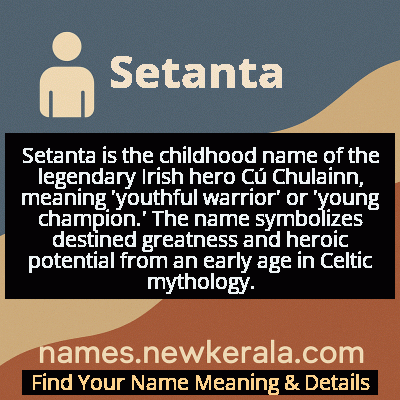Setanta Name Meaning & Details
Origin, Popularity, Numerology Analysis & Name Meaning of Setanta
Discover the origin, meaning, and cultural significance of the name SETANTA. Delve into its historical roots and explore the lasting impact it has had on communities and traditions.
Name
Setanta
Gender
Male
Origin
Celtic
Lucky Number
8
Meaning of the Name - Setanta
Setanta is the childhood name of the legendary Irish hero Cú Chulainn, meaning 'youthful warrior' or 'young champion.' The name symbolizes destined greatness and heroic potential from an early age in Celtic mythology.
Setanta - Complete Numerology Analysis
Your Numerology Number
Based on Pythagorean Numerology System
Ruling Planet
Saturn
Positive Nature
Ambitious, efficient, realistic, and authoritative.
Negative Traits
Materialistic, stressed, confrontational, and can be overly ambitious.
Lucky Colours
Dark blue, black.
Lucky Days
Saturday.
Lucky Stones
Blue sapphire, amethyst.
Harmony Numbers
2, 4, 6.
Best Suited Professions
Business leaders, managers, financial services, law enforcement.
What People Like About You
Leadership, determination, organizational skills.
Famous People Named Setanta
Setanta Ó hAilpín
Professional Athlete
Played both Australian rules football for Carlton and hurling for Cork
Setanta Saki
Mixed Martial Artist
Competed in professional MMA promotions internationally
Setanta Sports Network
Sports Broadcasting
Founded and operated major international sports television network
Name Variations & International Equivalents
Click on blue names to explore their detailed meanings. Gray names with will be available soon.
Cultural & Historical Significance
Throughout Irish history, the figure of Setanta/Cú Chulainn has been appropriated and reinterpreted by various movements, from medieval bards preserving oral traditions to 20th-century nationalists using him as a symbol of Irish resistance and cultural identity. The name represents not just a mythological character but the enduring power of Celtic heroic literature to shape cultural consciousness. In contemporary times, Setanta continues to serve as a touchstone for Irish cultural revival and a connection to pre-Christian Celtic traditions, maintaining its significance across centuries of social and political change while preserving the essential qualities of the heroic archetype it represents.
Extended Personality Analysis
The name Setanta evokes personality traits closely aligned with its mythological origins—courage, determination, and exceptional capability from a young age. Those named Setanta are often perceived as natural leaders with intense loyalty to their community and a strong protective instinct. They typically demonstrate early maturity and a sense of responsibility beyond their years, coupled with competitive drive and physical or mental prowess that sets them apart. The name suggests someone who thrives under pressure and embraces challenges, much like the young hero who single-handedly defended Ulster against overwhelming odds.
However, this heroic namesake also implies potential intensity and a tendency toward extremes. The mythological Setanta was known for his battle frenzy that made him nearly unstoppable but also dangerous to friends and foes alike. Modern bearers of the name often display passionate dedication to their causes, sometimes bordering on obsession, and a competitive nature that drives them to excel in their chosen fields. They tend to be fiercely independent yet deeply committed to those they consider under their protection, embodying the Celtic ideal of the warrior who serves a higher purpose while maintaining personal honor and integrity in all endeavors.
Modern Usage & Popularity
In contemporary times, Setanta remains a distinctive and culturally resonant choice, primarily used within Irish communities and by those with strong Celtic heritage connections. While never achieving widespread popularity, the name has experienced a modest revival among parents seeking unique names with deep mythological significance and cultural authenticity. Its usage is most prominent in Ireland and among diaspora communities, particularly in the United States, Canada, Australia, and the United Kingdom, where it serves as a meaningful link to Irish cultural identity. The name's association with the Setanta Sports network from 2004-2017 brought some modern visibility, though it remains relatively rare and carries strong cultural specificity that appeals to those deliberately choosing names with historical and mythological weight rather than following naming trends.
Symbolic & Spiritual Meanings
Symbolically, Setanta represents the concept of destined greatness and the hero in potential—the individual whose extraordinary qualities are evident from youth but require specific circumstances to fully manifest. The name embodies the Celtic understanding of geis, the sacred vow or personal destiny that shapes a hero's life, and the idea that true greatness emerges through accepting one's fate with courage and honor. It symbolizes transformation through action, as demonstrated by the mythological narrative where Setanta becomes Cú Chulainn through his own decisive act of responsibility and bravery. The name carries connotations of the warrior spirit balanced by protective loyalty, the individual whose personal excellence serves communal needs, and the eternal human aspiration toward heroic virtue that transcends its specific cultural origins to speak to universal themes of potential, destiny, and the making of legends.

